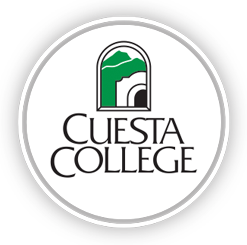DSPS Information for Faculty
Faculty Portal (AIM)
The DSPS Faculty Portal (AIM) is a secure website to review and manage student accommodation requests online. If you're already familiar with AIM, continue with the login below.
To learn more about viewing students' Faculty Notification Letters and managing Alternative Testing Accommodations online, please visit our Faculty How-To page.
Cuesta faculty has a key role in assuring that their classes are fully accessible to all populations. Depending on the student’s disability related barriers, faculty might be asked to allow for a wide range of reasonable accommodations as mandated by state and federal law.
Beyond legal compliance, universal design philosophy embodies the ideal that making the environment accessible for people with disabilities makes our world more user friendly for everyone. For example, wheelchair ramps benefit many people beyond just those who have mobility limitations.
The primary role for DSPS staff is to provide Cuesta College students, faculty, staff and administration with guidance and “know how” for disability accommodations. Together, we can team up and answer any questions you might have regarding disability, faculty rights and accessibility.
Helpful Links
Universal Design for Learning (UDL) is a framework to improve and optimize teaching and learning for all people based on scientific insights into how humans learn. Below are some recommendations based on UDL Quick Tips by the ACCESS Project. In addition, consider reviewing this primer on Universal Design of Instruction by the University of Washington's DO-IT Center.
Multiple Means of Engagement
- When establishing goals and objectives, begin by making a list of the knowledge, skills, and (if applicable) attitudes you want your students to achieve.
- Present information in multiple formats, including text, graphics, audio, and video.
- Whenever possible, tie new concepts to prior knowledge.
- Develop assessments directly from the objectives, even before designing course content.
Multiple Means of Representation
- Become familiar with student resources on campus, including DSPS, Student Success Programs, and others.
- Ensure that examples and content used in class are relevant to people from diverse backgrounds and experiences.
- Create a welcoming class environment. Learn students' names, if possible, and use their names when calling on them.
- When applicable, have students explore the meaning and value of their learning experiences to them-selves and to society.
Multiple Means of Action & Expression
- Communicate high expectations for all students, while expressing your willingness to make “appropriate accommodations” for students with disabilities.
- Consider accepting alternative project formats: oral presentations, videos, newspaper articles, photo essays, radio documentaries, community research, web publications, etc.
- Emphasize time on task. Create assignments that require students to practice recalling and utilizing information. Brain research confirms the adage “Practice makes perfect.”
- Give prompt, ongoing, and instructive feedback to support learning and self-assessment.


